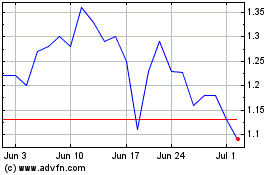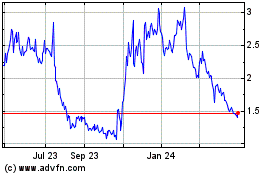LEAPS targets the non-mutating part of the
SARS-CoV-2 virus and works through activating a T cell response
possibly offering long term benefits
CEL-SCI Corporation (NYSE American: CVM) announced today
its LEAPS COV-19 peptides, delivered as a therapeutic treatment
following SARS-CoV-2 virus challenge, achieved a 40% survival rate
in transgenic mouse models as compared to 0% survival in the two
control groups in studies conducted at the University of Georgia
Center for Vaccines and Immunology.
Scientists at the University of Georgia working in conjunction
with CEL-SCI’s scientific team conducted a challenge study in
human(h) ACE2 receptor transgenic mice infected with a dose of
SARS-CoV-2 (the causative agent of COVID-19 disease) virus
sufficient to cause death in all animals within 8 days. This
transgenic animal model is useful to study COVID-19 disease because
the mice express the molecule that provides entry for the
SARS-CoV-2 virus into human cells. Virus infection is optimized in
this animal model providing an ideal system to determine vaccine
induced immune protection or therapy against a SARS-CoV-2 infection
of humans.
The animals were therapeutically treated with CEL-SCI’s LEAPS
COV-19 peptides one day after infection with a lethal dose of
SARS-CoV-2. Of the LEAPS treated mice, forty percent (40%) were
alive, recovering and regained lost weight, attaining > 90% of
their starting weight, by the study’s end. In contrast, mice in the
two control groups lost 20% or more of their body weight by day 8
and all of them died between day 5 and day 8 post challenge. The
success of this therapy was statistically significant at a 95%
level.
An additional study conducted using LEAPS as a vaccine to
prevent disease resulted in similar findings to the above described
study, but with a slightly lower level of statistical significance.
In this study, the Human(h) ACE2 transgenic mice were dosed twice
with the LEAPS conjugate 28 and 14 days prior to being challenged
with a lethal dose of SARS-CoV-2 virus.
“We are highly encouraged by these results, which clearly show
our LEAPS COV-19 peptides produced a survival benefit in a very
credible animal model, which mimics the virus’ effects in humans. A
critical benefit of LEAPS’s mechanism of action is its focus on
highly conserved portions within the nucleoprotein of the virus.
This may become very important as mutations in SARS-CoV-2 that
could limit a vaccine or treatment induced protection have already
been reported. While LEAPS can potentially work as a vaccine, the
greater need though is to provide better treatment for the acute
disease stage and also for the longer-term complications of the
virus. Helping those patients is our goal,” stated CEL-SCI CEO
Geert Kersten.
Daniel Zimmerman, Ph.D., Senior VP of Research Cellular
Immunology at CEL-SCI and discoverer of the LEAPS technology added,
“Based on prior animal studies we also know that LEAPS peptides can
reduce inflammation and cytokine storm. We think it is likely to
have a similar effect on the cytokine storm that causes severe
systemic COVID-19 disease. Our next step is to leverage the
findings from these two animal studies into future studies that
will optimize treatment dosing and test additional LEAPS peptides
as a therapy.”
Background on LEAPS and its Relevance to COVID-19
CEL-SCI’s goal is to develop an immunotherapy with the potential
to treat the SARS-CoV-2 virus using its patented LEAPS peptide
technology. The LEAPS peptides utilize conserved regions of
SARS-CoV-2 proteins to stimulate protective antibody and cell
mediated T cell responses to reduce viral load and systemic
inflammatory immune responses. The LEAPS peptide technology can be
used to construct immunotherapeutic peptides that exhibit both
antiviral and anti-inflammatory properties at the same time.
Consequently, these products not only target the virus infection
against which they are directed, but also elicit the appropriate
protective response(s) against it, without exacerbating an overly
active inflammation.
CEL-SCI’s studies are utilizing the LEAPS peptide approach,
which is unique in its proven ability in animals to elicit both a
cell mediated antiviral response and an anti-inflammatory
immunomodulating response by activating CD8 T lymphocytes. Previous
studies showed that LEAPS immunogens can prevent lethal infection
by herpes simplex virus (HSV) and stop the inflammatory disease
progression of rheumatoid arthritis in animal models. LEAPS
peptides against HSV demonstrated that the T cell response was
sufficient to prevent viral disease, and if there was residual
virus production, anti-viral antibody was generated to further
control the spread of the virus.
The LEAPS-COV-19 peptide conjugates are directed towards
antigens within the NP protein of SARS-Cov-2, the causative agent
of COVID-19. These conjugates elicit cytolytic T cell responses to
virus infected cells and immunomodulating responses. Unlike
glycoprotein spike antigens, which are utilized in antibody-based
vaccines, the T cell antigens are less variable between viral
strains and less likely to change in response to antibodies
elicited by prior infection or other vaccines. Cytolytic T cell
responses attack the virus infected cellular “factories” within the
infected host in order to eliminate the source of virus and help
subdue the infection.
Ligand Epitope Antigen Presentation System (LEAPS) platform
technology has demonstrated in several animal models the ability to
design antigen-specific immunotherapeutic peptides that
preferentially direct the immune response to a cellular (e.g., T
cell), humoral (antibody) or mixed response and are also capable of
enhancing important T-regulatory (Treg) responses. Therefore, the
LEAPS technology provides the opportunity to develop
immunotherapeutic products for diseases for which disease
associated antigenic peptide(s) sequences have already been
identified, such as: a number of infectious diseases, some cancers,
autoimmune diseases (e.g., RA), allergic asthma and allergy, select
CNS diseases (e.g., Alzheimer's) and the SARS-Cov-2 virus.
The Company's LEAPS technology is currently also being developed
as a therapeutic vaccine for rheumatoid arthritis and is supported
by $1.5 million grant for IND enabling studies from the National
Institute of Arthritis and Musculoskeletal and Skin Diseases.
About CEL-SCI Corporation
The Company’s LEAPS technology is currently being developed for
rheumatoid arthritis and as a potential treatment for COVID-19
infection/disease.
CEL-SCI is also close to the readout for a very large head and
neck cancer study using another immunotherapy product called
Multikine*. CEL-SCI believes that boosting a patient’s immune
system while it is still intact should provide the greatest
possible impact on survival. Therefore, in the Phase 3 study
CEL-SCI treated patients who are newly diagnosed with advanced
primary squamous cell carcinoma of the head and neck with the
investigational product Multikine first, BEFORE they received
surgery, radiation and/or chemotherapy. This approach is unique.
Most other cancer immunotherapies are administered only after
conventional therapies have been tried and/or failed. Multikine
(Leukocyte Interleukin, Injection), has received Orphan Drug
designation from the FDA for neoadjuvant therapy in patients with
squamous cell carcinoma (cancer) of the head and neck.
CEL-SCI believes that this Phase 3 study is the largest Phase 3
study in the world for the treatment of head and neck cancer. Per
the study’s protocol, newly diagnosed patients with advanced
primary squamous cell carcinoma of the head and neck were treated
with the Multikine treatment regimen first - for 3 weeks prior to
receiving the Standard of Care (SOC), which involves surgery,
radiation or concurrent radiochemotherapy. Multikine is designed to
help the immune system “see” the tumor at a time when the immune
system is still relatively intact and thereby thought to better be
able to mount an attack on the tumor. The aim of treatment with
Multikine is to boost the body’s immune system prior to SOC to
attack the cancer. The Phase 3 study is fully enrolled with 928
patients and the last patient was treated in September 2016. To
prove an overall survival benefit, the study requires CEL-SCI to
wait until 298 events have occurred among the two main comparator
groups. This study milestone occurred in late April 2020.
The Company has operations in Vienna, Virginia, and near/in
Baltimore, Maryland.
Forward-Looking Statements
This press release contains forward-looking statements within
the meaning of Section 27A of the Securities Act of 1933, as
amended, and Section 21E of the Securities Exchange Act of 1934, as
amended, including statements with respect to Multikine and the
Phase 3 clinical trial of Multikine in patients with advanced
primary squamous cell carcinoma of the head and neck. When used in
this press release, the words "intends," "believes," "anticipated,"
"plans" and "expects," and similar expressions, are intended to
identify forward-looking statements. Such statements are subject to
risks and uncertainties that could cause actual results to differ
materially from those projected. Factors that could cause or
contribute to such differences include, an inability to duplicate
the clinical trials or nonclinical results demonstrated in clinical
studies, timely development of any potential products that can be
shown to be safe and effective, receiving necessary regulatory
approvals, difficulties in manufacturing any of the Company's
potential products, inability to raise the necessary capital and
the risk factors set forth from time to time in CEL-SCI's filings
with the Securities and Exchange Commission, including but not
limited to its report on Form 10-K/A for the year ended September
30, 2019. The Company undertakes no obligation to publicly release
the result of any revision to these forward-looking statements
which may be made to reflect the events or circumstances after the
date hereof or to reflect the occurrence of unanticipated
events.
* Multikine (Leukocyte Interleukin, Injection) is the trademark
that CEL-SCI has registered for this investigational therapy, and
this proprietary name is subject to FDA review in connection with
the Company's future anticipated regulatory submission for
approval. Multikine has not been licensed or approved for sale,
barter or exchange by the FDA or any other regulatory agency.
Similarly, its safety or efficacy has not been established for any
use. Moreover, no definitive conclusions can be drawn from the
early-phase, clinical-trials data involving the investigational
therapy Multikine. Further research is required, and early-phase
clinical trial results must be confirmed in the Phase 3 clinical
trial of this investigational therapy that is in progress.
View source
version on businesswire.com: https://www.businesswire.com/news/home/20201201005307/en/
COMPANY CONTACT: Gavin de Windt CEL-SCI Corporation (703)
506-9460 www.cel-sci.com
Cel Sci (AMEX:CVM)
Historical Stock Chart
From Mar 2024 to Apr 2024

Cel Sci (AMEX:CVM)
Historical Stock Chart
From Apr 2023 to Apr 2024
